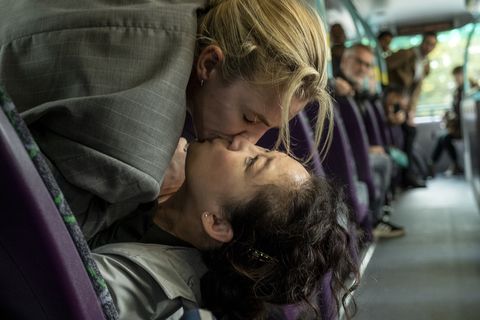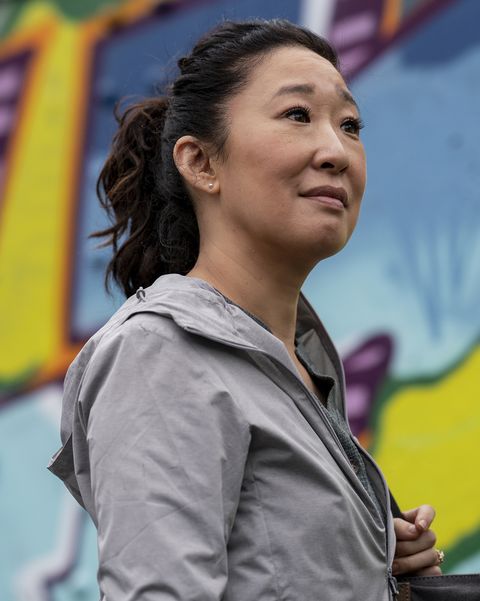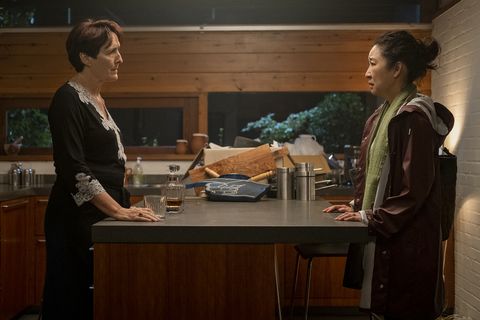Spoilers for Killing Eve season 3 episode 3, “Meetings Have Biscuits” below.
It took 19 episodes, but Killing Eve finally gave the people what they really, really wanted: A kiss between Eve (Sandra Oh) and Villanelle (Jodie Comer). It’s a scene so surreal, I had to rewind twice to make sure it wasn’t a dream sequence, and I can confirm that this is, in fact, Eve’s reality: She’s riding a bus and thinking about how she failed Niko (again) when Villanelle boards the bus. Eve combusts: There’s screaming, there’s punching, there’s that sexual tension we can’t get enough of, and then, Eve gives into it. Then she head-butts Villanelle. It’s delicious, and more importantly, manages to surprise Villanelle, who’s usually unflappable when it comes to her prey. She exits the bus before Eve can process what just happened.
Yes, Oh loved that scene as much as you did, but she hesitates to analyze it. “I don’t want to define it, because it’s so many things,” she says. “When the idea came, I believed it immediately, it made emotional sense immediately, and we enjoyed bouncing around on that bus.” So yes, the sequence was a blast, but it doesn’t detract from the season’s most important question: Who killed Kenny, and why?
Below, Oh opens up about why Kenny’s death had to happen, an acting epiphany she had on the set of Grey’s Anatomy, and the “war” Eve and Villanelle will experience before the season’s over.
How did you feel about Eve and Villanelle reconnecting on the bus?
In some ways, all the scenes between Eve and Villanelle are their own show within our show. They live in a heightened place that can be ambiguous. So something as crazy as having a physical fight on a moving bus, and then to pick an action as intimate as a kiss? That was a joy to play. You’re taking something that we’re so used to meaning one thing, and suddenly it means a million other things.
As both lead actor and executive producer, what was the biggest adjustment for you coming into season 3?
How to get Eve back in the game emotionally. That was the biggest question I posed to Suzanne Heathcote, who is the head writer of season 3: Can you come up with an idea that is bigger than the “no” Eve gave Villanelle at the end [of season 2], and then getting shot? If you can find an emotional reason that is equal to or outweighs that, then I can get back in. And she frigging came up with one, to a big sacrifice. When she pitched me the idea, I was just like [gasps]. But the EP half of me is like, “That’s frigging great.” It’s great to get Eve back in, it’s an amazing story character journey for Carolyn, and it opens up all these other avenues and other worlds.
How did you balance all the emotions of these early episodes? Eve is really struggling at the beginning, and that’s before she has to deal with Kenny’s death.
In the first episode you see the consequences of the end of season 2: Eve is traumatized. She’s in retreat. Suzanne and I tried to express it in subtle ways. Eve doesn’t necessarily look like she’s thriving: She’s drinking, her flat is quite depressing, she works in the back of the kitchen—seemingly simple or menial work. And she is also in physical pain. But she’s actually at a stronger place than we’ve ever seen her. Even though she’s wearing crap clothes and looks like crap, she is telling her boss, “I don’t want to work in the front. I want to work in the back of the kitchen.” You [might] think a person who’s thriving should be in the front or should look like this; a person who has a good job should be earning this money or whatever. And that’s just not fucking true. Who’s to say that the powerful person is heading a corporation? [Someone] who is truly powerful is becoming more independent, is shedding the layers of expectation and starting to say, “No. I don’t want [that].”
In the first few episodes, you see her say no to a bunch of people in ways you’ve never seen her say no. The way she says no to Kenny is expressing her vulnerability. The way she says no to Carolyn is expressing her fucking fury. [Laughs] But the way she says no to her boss about how she could make more money in the front of the house, it’s like, when you go through a trauma, you go through something very, very difficult. You understand something deep about life that other people might not understand, and it’s fine. It’s also the grace of maturing. The idea of something like success: We are brainwashed to think it looks one way. It takes a long time and it just doesn’t come to you—you have to investigate it, you have to open your eyes and awaken to the fact that of all the ways you have been taught what success is, it’s up to you to choose what it is.
That feels like such a radical thing to see on TV.
During COVID, I’m sure everyone has not only been stressed but also more introspective. It forces you to be. This is also the grace of playing Eve. The idea of MI6 and the idea of “The Twelve” are invisible systems that Eve realizes she’s working for and entangled in. Eventually, what will happen near the end of this third season and hopefully going into the fourth, is how she wants to free herself from [them], or really, do some sort of final battle with. [Laughs] But that’s also what I want to ultimately build with [this] character: A woman who wakes up to herself, and by her own action, frees herself.
The relationship between Carolyn and Eve keeps getting deeper—and weirder. How do you develop that with Fiona Shaw?
You’ll see Carolyn deal with her children—one who is not there, and one who is. She becomes a more complex figure through the death of her son. And I can’t say enough about Fiona Shaw. She’s such a powerful actor and we work really well together. We see a mentor/mentee dynamic at the beginning of the entire series, and then season 2, you see that Eve thinks she has more control, but she doesn’t and is betrayed by the mentor. And now, season 3 is how Eve is trying to change the dynamic in their relationship.
And really, [we] work hard on [these] scenes. The amazing thing about playing it is, my whole body has played it. And what I mean by that is, is when I have changed through the character, I have changed [as a person]. It was an acting light bulb that came for me on season 8 of Grey’s. It was this long sequence when Owen and Cristina were breaking up, and the scene was Owen telling Cristina that he slept with someone. Kevin McKidd and I are very close. We have that great acting relationship where you can do anything with your partner. So Cristina is crying on the bed and my AD [assistant director] Annette [Sutera] goes, “Do you need a moment to prepare?” Because [Cristina’s] in a very hard emotional place. And I was like, “No no, just roll it.” And everything changed. Everything was there, everything was present, all the feelings were there.
When you have a crew that you trust and a home that you trust, an actor will become more open and more fluid. We are more able to access depth when we feel safe. Here I am having to open up into a flood of tears, but I have worked with everyone for eight years. There’s no outside fear or insecurity about anything. And I don’t have to imagine feeling betrayed, because I have been acting with this actor and I’ve been playing all this stuff for the past 10 years. It’s already gone through my body. So for Carolyn and Eve, we’ve passed that point of mentor and mentee. Now, we’re only interested in growing. There’s no point in retreading places without a point.
This episode made me realize that I don’t know if Eve or Villanelle will ever feel completely whole without the other.
Therein lies the great human search for wholeness. It’s the essence of drama. This is a thing that I’ve always been interested in: Creating the character of a woman who actively makes herself whole.
And there’s a difference between Eve not thinking she’s whole and actually not being whole. Maybe she is from the outside, but what does it mean if she doesn’t feel complete without Villanelle?
In some ways, you’re free when you can walk away. You’re free from any type of relationship or system when you understand that you’re not being ruled by unconscious attachments and desires. And neither of them [Eve nor Villanelle] are. But I will say, at the end of the season, it does shift. The uncontrolled reaction of [episode 3] is familiar territory for them both. But they have shifted by the end of season 3, and their relationship drops a decibel. I’m kind of equating it to war: I fought for one side and you fought for another side, but we both went through this war. So in some ways, they can only find solace and understanding from each other. For Eve, it’s [the question of], who really knows me? Who do I count on? Who can I trust?



